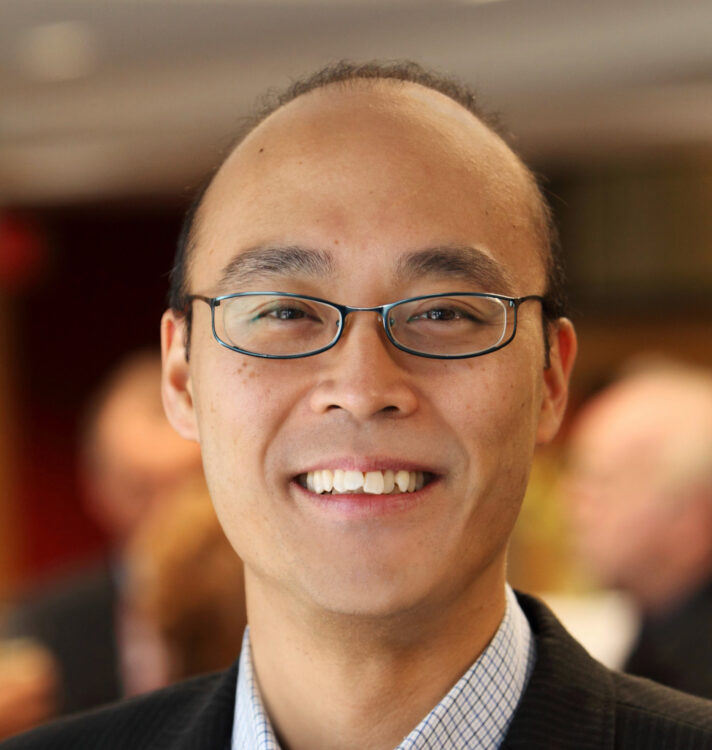The Principal’s Prize for Excellence in Teaching recognizes the commitment of outstanding teachers who are the very core of the academic experience of McGill students. During Fall 2021 Convocation ceremonies, six of McGill’s exceptional educators will be awarded a Principal’s Prize. Lawrence Chen, a member of the Faculty of Engineering’s Department of Electrical & Computer Engineering, is this year’s winner of the Principal’s Prize in the Full Professor category.
Lawrence Chen describes standing in front of his very first class at McGill “like flying in the dark with no navigation system.”
“My first teaching assignment was ECSE 304 Signals and Systems 2 which is the second of two courses taught at the time on the topic,” says Chen. “I could hear a pin drop in the class of about 90 students. It was very silent and I think students were generally giving me their undivided attention. At that time, my focus was to try to explain the difficult concepts in a clear manner so that they could understand the material (much in the same way I ran tutorials as a graduate student). But I had no real idea whether or not students understood anything. The silence persisted whenever I asked if there were questions. I had no idea about strategies to engage students more in class and basically, I had no sense on my effectiveness as an instructor.”

“My view of a positive learning experience was one where the student could understand easily the content being delivered by the instructor,” he says. “This was the very perception of teaching excellence that I had as a student: Teaching should focus on content delivery and an excellent teacher should be able to convey information in a digestible and simple manner. Moreover, if the content could be understood from the lectures, then solving problems on assignments and other assessments would be straightforward. This is what guided my teaching approach for the first 12 years of my career.”
But after attending a workshop on teaching and learning, Chen began reevaluating his teaching methods and philosophy.
“I started to appreciate how the learning environment, assessment strategies, and interaction and engagement with course content could have such a strong impact in shaping the student learning experience,” he said. “I heard about strategies such as peer instruction and flipped learning.”
After taking a number of classes (“even going back to Cegep!”) where such strategies were used, Chen began employing them in his own courses. A decade later, Chen is renowned for his innovative teaching methods and an unwavering commitment to providing students with the best learning experience possible.
Innovation, adaptability in the face of COVID challenges
His innovative spirit served Chen – and his students – well when faced with the challenges of the COVID-19 pandemic.
“I had been using flipped learning for a few years prior to the start of the pandemic. Content is provided to students largely outside of class, e.g., in the form of short instructional videos or readings, while class is devoted to reviewing/summarizing concepts, testing understanding of the concepts, and practice with problem solving,” he says. “When we transitioned to emergency remote learning for the last few weeks of the winter 2020 semester, I was still able to run the flipped learning approach in Zoom. A number of students commented that they did not experience significant difficulty in the transition.”
Always looking to upgrade his skillset, Chen made it a point to learn how to better engage students in the online format in preparation for the 2020-2021 academic year. He attended webinars organized by Teaching and Learning Services, taking part in workshops and meeting regularly with Engineering colleagues to share their experiences and strategies for teaching and learning in the remote context.
“I made a significant effort to scaffold student learning and while implementing various strategies may have taken more time or required more organization, I think they resulted in more positive learning experiences for the students,” he says. “I certainly plan to continue using a number of these strategies in the future.”
While he is an active proponent of innovative teaching methods, Chen’s advice for new teachers is to incorporate new ideas organically.
“I would start by saying to simply be yourself. While you might learn about new strategies or pedagogies, you should not feel pressured nor the need to implement any of them immediately – and certainly, not all at once,” he says.
“Build things slowly, doing and using what strategies you are comfortable with. Try to find like-minded colleagues that you can meet, discuss, and share your teaching experiences with. Finally, it is never too late to think about writing your teaching statement or set of guiding principles for your teaching endeavours (which is needed as part of your tenure and promotion dossiers). But do not forget to revisit this statement frequently and revise as necessary.”
